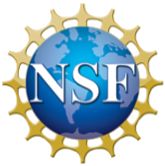NSF awarded two CZ Research Coordination Networks
The National Science Foundation (NSF) Division of Earth Sciences (EAR) within the Directorate for Geosciences (GEO) has awarded two Research Coordination Networks (RCNs) for Driving Convergent Science in the Critical Zone. In July 2018, the NSF released a Dear Colleague Letter detailing the intent to support RCNs for the various CZ-science research communities to communicate their research and to synthesize investigations of key CZ problems, ideas and practices. The two abstracts awarded include:
- Award Abstract #1905259 CZ RCN: Research Coordination in Carbonate Critical Zones
- Award Abstract #1904527 CZ RCN: Expanding knowledge of the Earth's Critical Zone: connecting data to models
Award Abstract #1905259
CZ RCN: Research Coordination in Carbonate Critical Zones
Investigator(s): Jonathan Martin jbmartin@ufl.edu (Principal Investigator, University of Florida)
Laura Toran (Co-Principal Investigator, Temple University)
Matthew Covington (Co-Principal Investigator, University of Arkansas)
Abstract:
The Critical Zone, defined as the thin layer of Earth's surface between the top of vegetation and the bottom of groundwater, is the site of complex interactions among rock, soil, water, air, and living organisms. These interactions provide societal benefits, including life-sustaining resources, primary among them food and water. Processes in the Critical Zone operate over wide range of time scales that depend, in part, on the composition of the underlying bedrock. Silicate minerals that break down slowly comprise much of the bedrock, but carbonate minerals in limestone tend to react quickly, commonly leaving large voids that facilitate the transfer of water through the Critical Zone. The current Critical Zone Observatory (CZO) network lacks a site that contains significant amounts of carbonate bedrock. This Research Coordination Network will foster discussion among researchers about Critical Zones with elevated carbonate mineral contents, evaluate how properties and processes of carbonate-rich Critical Zones can be generalized to other lithologies, and integrate these findings with results from the CZO network.
A principal goal of this project is to create a Research Coordination Network (RCN) in which researchers can evaluate Critical-Zone properties and processes that are endemic to Critical Zones in carbonate terrains. A related and equally important goal is to integrate new findings with on-going research within the CZO network. These goals will be achieved through four primary technical objectives: (1) compile available data and models stemming from current research ;(2) convene workshops, in the field and at major disciplinary conferences to explore new research directions; (3) build capacity in state- of-the-art techniques used to study carbonate Critical Zones; (4) use data compilation, workshop participation, and training to advance knowledge of properties and processes in all Critical-Zone environments. Outcomes of these objectives will include expanding knowledge of how relative amounts of carbonate and silicate minerals may cause different properties and processes in the Critical Zone between regions. This Research Coordination Network will also develop human capital of Critical-Zone science by including underrepresented groups in all project activities and by research collaborations created during workshops. Outcomes will be disseminated among the research community through workshop reports, a series of three peer-reviewed papers, and the project website.
Award Abstract #1904527
CZ RCN: Expanding knowledge of the Earth's Critical Zone: connecting data to models
Investigator(s): Kamini Singha ksingha@mines.edu (Principal Investigator, Colorado School of Mines)
Nicole Gasparini (Co-Principal Investigator, Tulane University)
Li Li (Co-Principal Investigator, Pennsylvania State University)
Pamela Sullivan (Co-Principal Investigator, University of Kansas)
Nicole West (Co-Principal Investigator, Central Michigan University)
Abstract
The "Critical Zone" of the Earth includes the portion of the planet from the atmosphere through groundwater. Important characteristics of the Critical Zone are buried within it: how does the ground beneath our feet vary, how has it developed over time, and, how can we predict changes that may occur across time and space. Addressing these questions will affect how we manage the projected increase in demand for food, energy, and water that will accompany the growth in human population to 9 billion people by 2050. This project is a Research Coordination Network (RCN) that will bring together scientific expertise and students to explore these topics.
This research coordination network (RCN) is intended to synthesize data and models to investigate a key research question: How has the structure of the Critical Zone evolved in the past and how will it respond to future perturbations resulting from increasingly intensive human activities? Quantifying the depth of Critical-Zone processes is important because it connects multiple areas of investigation: water storage, weathering, biogeochemical fluxes, and societal needs. Coupling models to data is difficult, since different research domains define the Critical Zone by changes in conditions that are hard to reconcile. Quantifying the gradient in properties that may define the lower boundary of the Critical Zone requires an injection of new ideas, methods, and people from across disciplines. This RCN is built around the following four topics: 1) synthesis efforts that help guide the coming decade of research on Critical-Zone architecture; 2) exploration of a diverse set of complimentary approaches for identifying the lower boundary of the Critical Zone and its influence on processes; 3) training of scientists in multidisciplinary data collection and modeling approaches; and 4) pathways to develop the next generation of Critical-Zone models. This RCN will involve at least 100 scientists, including early-career faculty, postdoctoral associates, and graduate students. Participants will be recruited from underrepresented ethnic, socio-economic, ability, and sexual identity groups. In addition to large and small meetings of the participants, this RCN will offer workshops at annual meetings and through webinars that focus on networking, diversifying research skills, and proposal development that will benefit a wider cross-section of early-career professionals.
News Category:
AWARD
Related News
Explore Further

